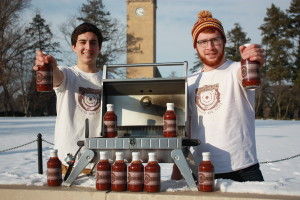Grilling the competition, Deadeye BBQ makes history and wins big

From Left: Michael Hanstad and Tyler Devos, both Sophomores in the college of Business, are the two founders of Deadeye BBQ which is in numerous stores in the state of Iowa.
November 2, 2017
Iowa State’s entrepreneurship program made history as it not only placed in the top three, but took first place at the national Collegiate Entrepreneurs Organization (CEO) competition, for the first time in 22 years.
This past week, a group of students traveled to Tampa, Florida to attend the annual national CEO conference.
The conference brings college entrepreneurs from all around America to learn from keynote speakers, network with other entrepreneurs and even pitch their own business for the chance of winning $5,000 in addition to qualifying for the U.Pitch competition in Chicago.
This year, Iowa State sent 14 students and one faculty member to the three-day conference from Oct. 26 to 28. U Conceal It by Andrew Pauley and Deadeye BBQ by Michael Hanstad and Tyler DeVos represented Iowa State as they pitched their businesses to a panel of judges.
The pitch competition consisted of three rounds, with an applicant pool of 150 pitchers which was narrowed down to 60 in the first round, down to 12 in the second round and six pitchers competing in the third and final round from which the top three were selected.
The final round featured businesses and ideas ranging from tech for sharing studio space, to mug lids for on the go mug use. DeVos pitched for Deadeye BBQ all three rounds.
After each pitch the judges would ask a series of questions about revenue streams, distribution channels, customer demographics and many more similar questions to both understand the business and test the young entrepreneurs understanding of their own business.
“I describe his Q&A like being at a soccer shoot out, where every ball went in, and each question that he got was another goal,” said Judi Eyles, director of the Pappajohn Center for Entrepreneurship.
Each round consisted of a fresh set of judges and a fresh set of questions.
“I knew all the answers because I ask myself those questions every day, it was almost like I had all the answers to the test,” DeVos said.
Prior to the pitch competition, DeVos met with Eyles for two hours a week for a month to craft the pitch. With Eyles’ help, DeVos and Hanstad were able to lay out the storyline for their winning pitch.
“It was super easy, because at the end of the day I was talking about my experiences…I get up for this everyday, I am excited about this, otherwise I wouldn’t be doing it,” DeVos said.
DeVos leveraged their unique story of finding the old barbecue sauce recipe on a notecard in his aunt’s cupboard to learning the ins and outs of building a business and discovering the difficulties of balancing school when pitching their business.
In the final round, DeVos pitched in front of seven judges and a room filled with over 150 people consisting of fellow entrepreneurs, friends and family.
“I could not tell you who was in the room, because it was like no one was there, that’s how focused I was on the judges, making sure I had eye contact with them and that I was speaking directly to them,” DeVos said.
When declared the winners, the two founders took the stage with smiles spread from ear-to-ear, taking pictures and talking to the swarm of other entrepreneurs who congratulated them.
“It was like the proud mom, moment,” Eyles said. “Just watching Tyler [DeVos] go from his first pitch to where he was and the way he answered those questions, I had confidence that he was going to be at least top three.”
Along the road of building Deadeye BBQ, Hanstad and DeVos have picked up a number of skills from approaching store managers and building their communication skills to getting hands-on experience working with the cash flows of their business.
“From getting the raw material and turning it into its finished good, you get a more in-depth and real-world experience from what you get in the classroom,” Hanstad said. “I’ve been able to take the knowledge from the classroom and put it to action at the same time.”
For students interested in starting their own business Hanstad advised: “Just go for it, this is the best time to start a business.”















